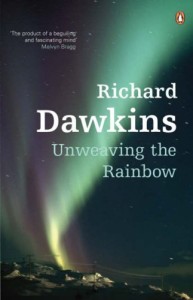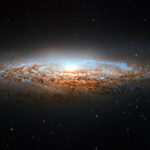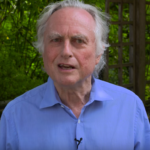“Unweaving the Rainbow”
by Stephen M. Barr
Filed under Book Reviews
Unweaving the Rainbow: Science, Delusion and the Appetite for Wonder
by Richard Dawkins
Houghton Mifflin , 352 pages, 1998
In reading Richard Dawkins I am reminded of an anecdote told by Werner Heisenberg. Heisenberg and several other great physicists were sitting around one evening talking about God and religion. The discussion ended up being dominated by Paul Dirac, who went into a long diatribe declaring religion to be the opiate of the masses. At the end of the evening someone turned to the brilliant Wolfgang Pauli and said, "You have been very quiet tonight, Pauli. What do you think of what Dirac has been telling us?" Pauli responded, "If I understand Dirac correctly, his meaning is this: there is no God, and Dirac is his Prophet."
 Richard Dawkins was not always a prophet. In his early days he wrote well–regarded papers on the rules for grooming in flies and the nesting strategies of digger wasps. It was while toiling in the vineyards of zoological science that he apparently heard the call to preach. His pulpit is an endowed chair in "the Public Understanding of Science" at Oxford, and the message he proclaims in his elegantly written, if somewhat waspish, books and articles is that the universe and life have no meaning. "The universe we observe," he says, "has precisely the properties we should expect if there is at bottom no design, no purpose, no evil, no good, nothing but pointless indifference."
Richard Dawkins was not always a prophet. In his early days he wrote well–regarded papers on the rules for grooming in flies and the nesting strategies of digger wasps. It was while toiling in the vineyards of zoological science that he apparently heard the call to preach. His pulpit is an endowed chair in "the Public Understanding of Science" at Oxford, and the message he proclaims in his elegantly written, if somewhat waspish, books and articles is that the universe and life have no meaning. "The universe we observe," he says, "has precisely the properties we should expect if there is at bottom no design, no purpose, no evil, no good, nothing but pointless indifference."
The root of Dawkins’ philosophy is the insight, derived from neo–Darwinian theory, that life has no ulterior purpose, biologically speaking. Mosquitoes exist to replicate mosquito DNA and dung beetles to replicate dung beetle DNA. The whole drama of life is a meaningless genetic competition. Not surprisingly, many people find Dawkins’ vision of a pointless universe rather repellant. He has been accused of spreading a cold and joyless message, a pessimistic nihilism. The present book seems to have been written to respond to these charges. Its preface begins thus:
"A foreign publisher of my first book confessed that he could not sleep for three nights after reading it, so troubled was he by what he saw as its cold, bleak message. Others have asked me how I can bear to get up in the mornings. A teacher from a distant country wrote to me reproachfully that a pupil had come to him in tears after reading the same book, because it had persuaded her that life was empty and purposeless."
This preface filled me with the keenest anticipation. I had always wondered what consolations could be found in a philosophy like Dawkins’. What would he have to say to that sleepless publisher or that desperate girl? Not what you might have expected. Here is a passage from chapter one, in which he is describing the time–line of life on earth:
"Fling your arms wide in an expansive gesture to span all of evolution from its origin at your left fingertip to today at your right fingertip. All across your midline to well past your right shoulder, life consists of nothing but bacteria."
"Many–celled, invertebrate life flowers somewhere around your right elbow. The dinosaurs originate in the middle of your right palm, and go extinct around your last finger joint. The whole history of Homo sapiens and our predecessor Homo erectus is contained in the thickness of one nail clipping. As for recorded history; as for the Sumerians, the Babylonians, the Jewish patriarchs, the dynasties of Pharaohs, the legions of Rome, the Christian Fathers, the Laws of the Medes and Persians which never change; as for Troy and the Greeks, Helen and Achilles and Agamemnon dead; as for Napoleon and Hitler, the Beatles and Bill Clinton, they and everyone that knew them are blown away in the dust of one light stroke of a nail file."
Vivid, striking, accurate, but hardly consoling.
Indeed, what Dawkins has to say to troubled souls is, basically, to grow up and stop snivelling: "The adult world may seem a cold and empty place," he writes, "with no fairies and no Father Christmas, no Toyland or Narnia, no Happy Hunting Ground where mourned pets go, and no angels—guardian or garden variety. . . . Yes, Teddy and Dolly turn out not to be really alive."
Dawkins believes that the charge of nihilism and coldness leveled against his philosophy stems from a certain view of science which sees it ridding the world of poetry and romance by explaining things previously steeped in wonder. The title of his book is taken from Keats’ poem "Lamia": "Do not all charms fly / At the mere touch of cold philosophy? / . . . / Philosophy will clip an angel’s wings, / Conquer all mysteries by rule and line, / Empty the haunted air, and gnomed mine— / Unweave a rainbow . . ." The word "philosophy" here refers to "natural philosophy," i.e., science, and the "unweaving" to Isaac Newton’s explanation of the rainbow as being due to the prismatic effect of raindrops.
Read the rest of the review.
Related Posts
Note: Our goal is to cultivate serious and respectful dialogue. While it's OK to disagree—even encouraged!—any snarky, offensive, or off-topic comments will be deleted. Before commenting please read the Commenting Rules and Tips. If you're having trouble commenting, read the Commenting Instructions.












